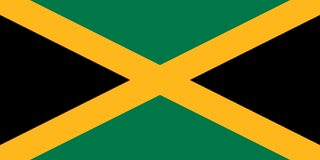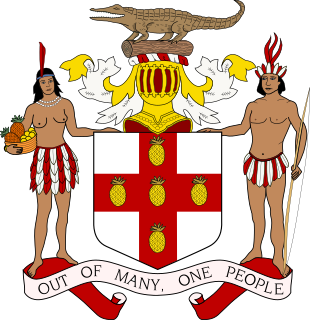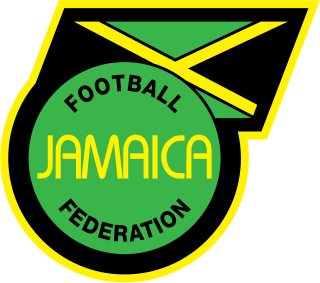Related Research Articles

Jamaica is an island country situated in the Caribbean Sea. Spanning 10,990 square kilometres (4,240 sq mi) in area, it is the third-largest island of the Greater Antilles and the Caribbean. Jamaica lies about 145 kilometres (90 mi) south of Cuba, and 191 kilometres (119 mi) west of Hispaniola ; the British Overseas Territory of the Cayman Islands lies some 215 kilometres (134 mi) to the north-west.

Reggae is a music genre that originated in Jamaica in the late 1960s. The term also denotes the modern popular music of Jamaica and its diaspora. A 1968 single by Toots and the Maytals, "Do the Reggay" was the first popular song to use the word "reggae", effectively naming the genre and introducing it to a global audience. While sometimes used in a broad sense to refer to most types of popular Jamaican dance music, the term reggae more properly denotes a particular music style that was strongly influenced by traditional mento as well as American jazz and rhythm and blues, and evolved out of the earlier genres ska and rocksteady. Reggae usually relates news, social gossip, and political commentary. It is instantly recognizable from the counterpoint between the bass and drum downbeat and the offbeat rhythm section. The immediate origins of reggae were in ska and rocksteady; from the latter, reggae took over the use of the bass as a percussion instrument.
Ska is a music genre that originated in Jamaica in the late 1950s and was the precursor to rocksteady and reggae. It combined elements of Caribbean mento and calypso with American jazz and rhythm and blues. Ska is characterized by a walking bass line accented with rhythms on the off beat. It was developed in Jamaica in the 1960s when Stranger Cole, Prince Buster, Clement "Coxsone" Dodd, and Duke Reid formed sound systems to play American rhythm and blues and then began recording their own songs. In the early 1960s, ska was the dominant music genre of Jamaica and was popular with British mods and with many skinheads.

Kingston is the capital and largest city of Jamaica, located on the southeastern coast of the island. It faces a natural harbour protected by the Palisadoes, a long sand spit which connects the town of Port Royal and the Norman Manley International Airport to the rest of the island. In the Americas, Kingston is the largest predominantly English-speaking city south of the United States.

Rastafari, sometimes called Rastafarianism, is a religion that developed in Jamaica during the 1930s. It is classified as both a new religious movement and a social movement by scholars of religion. There is no central authority in control of the movement and much diversity exists among practitioners, who are known as Rastafari, Rastafarians, or Rastas.
Jamaican English, including Jamaican Standard English, is a variety of English native to Jamaica and is the official language of the country. A distinction exists between Jamaican English and Jamaican Patois, though not entirely a sharp distinction so much as a gradual continuum between two extremes. Jamaican English tends to follow British English spelling conventions.
Dancehall is a genre of Jamaican popular music that originated in the late 1970s. Initially, dancehall was a more sparse version of reggae than the roots style, which had dominated much of the 1970s. In the mid-1980s, digital instrumentation became more prevalent, changing the sound considerably, with digital dancehall becoming increasingly characterized by faster rhythms. Key elements of dancehall music include its extensive use of Jamaican Patois rather than Jamaican standard English and a focus on the track instrumentals.

The prime minister of Jamaica is Jamaica's head of government, currently Andrew Holness. Holness, as leader of the governing Jamaica Labour Party (JLP), was sworn in as prime minister on 7 September 2020, having been re-elected as a result of the JLP's landslide victory in the 2020 Jamaican general election.

Jamaica is a neighborhood in the New York City borough of Queens. It is mainly composed of a large commercial and retail area, though part of the neighborhood is also residential. Jamaica is bordered by Hollis to the east; St. Albans, Springfield Gardens, Rochdale Village to the southeast; South Jamaica to the south; Richmond Hill and South Ozone Park to the west; Briarwood to the northwest; and Kew Gardens Hills, Jamaica Hills, and Jamaica Estates to the north.

Montego Bay is the capital of the parish of St. James in Jamaica. The city is the fourth-largest urban area in the country by population, after Kingston, Spanish Town, and Portmore, all of which form the Greater Kingston Metropolitan Area, home to over half a million people. As a result, Montego Bay is the second-largest anglophone city in the Caribbean, after Kingston.
Jamaican cuisine includes a mixture of cooking techniques, flavours and spices influenced by Amerindian, African, Irish, English, French, Portuguese, Spanish, Indian, Chinese and Middle Eastern people who have inhabited the island. It is also influenced by the crops introduced into the island from tropical Southeast Asia, many of which are now grown locally. A wide variety of seafood, tropical fruits and meats are available.

The Jamaica national football team, nicknamed the "Reggae Boyz", represents Jamaica in international football. The team's first match was against Haiti in 1925. The squad is under the supervising body of the Jamaica Football Federation (JFF), which is a member of the Caribbean Football Union (CFU), Confederation of North, Central American and Caribbean Association Football (CONCACAF), and the global jurisdiction of FIFA. Jamaica's home matches have been played at Independence Park since its opening in 1962.

Jamaican Patois is an English-based creole language with West African influences, spoken primarily in Jamaica and among the Jamaican diaspora. A majority of the non-English words in Patois come from the West African Akan language. It is spoken by the majority of Jamaicans as a native language.

The Jamaica Football Federation (JFF) is the governing body of football in Jamaica and is in charge of the Jamaica national football team and the Jamaica National Premier League.

The Parliament of Jamaica is the legislative branch of the government of Jamaica. It consists of three elements: The Crown, the appointed Senate and the directly elected House of Representatives.

Usain St. Leo Bolt,, is a retired Jamaican sprinter, widely considered to be the greatest sprinter of all time. He is the world record holder in the 100 metres, 200 metres, and 4 × 100 metres relay.

Robert Nesta Marley was a Jamaican singer, musician, and songwriter. Considered one of the pioneers of reggae, his musical career was marked by fusing elements of reggae, ska, and rocksteady, as well as his distinctive vocal and songwriting style. Marley's contributions to music increased the visibility of Jamaican music worldwide, and made him a global figure in popular culture to this day. Over the course of his career, Marley became known as a Rastafari icon, and he infused his music with a sense of spirituality. He is also considered a global symbol of Jamaican music and culture and identity, and was controversial in his outspoken support for democratic social reforms. In 1976, Marley survived an assassination attempt in his home, which was thought to be politically motivated. He also supported legalization of marijuana, and advocated for Pan-Africanism.

The monarchy of Jamaica is a constitutional system of government in which a hereditary monarch is the sovereign and head of state of Jamaica. The terms Crown in Right of Jamaica, Her Majesty in Right of Jamaica, or The Queen in Right of Jamaica may also be used to refer to the entire executive of the government of Jamaica. Though the Jamaican Crown has its roots in the British Crown, it has evolved to become a distinctly Jamaican institution, represented by its own unique symbols.

Jamaicans are the citizens of Jamaica and their descendants in the Jamaican diaspora. The vast majority of Jamaicans are of African descent, with minorities of Europeans, East Indians, Chinese, Middle Eastern, and others of mixed ancestry. The bulk of the Jamaican diaspora resides in other Anglophone countries, namely Canada, the United States and the United Kingdom. Jamaican populations are also prominent in other Caribbean countries, territories and Commonwealth realms, where in the Cayman Islands, Jamaican born residents make up 22.6% of the population. Outside of Anglophone countries, the largest Jamaican diaspora community lives in Costa Rica, where Jamaicans make up a significant percentage of the population.

Jamaica was an English colony from 1655, and a British colony from 1707 until 1962, when it became independent. Jamaica became a Crown colony in 1866.
References
- ↑ Cundall, Frank. (1915) Historic Jamaica. London: Institute of Jamaica. pp. xviii-xix.